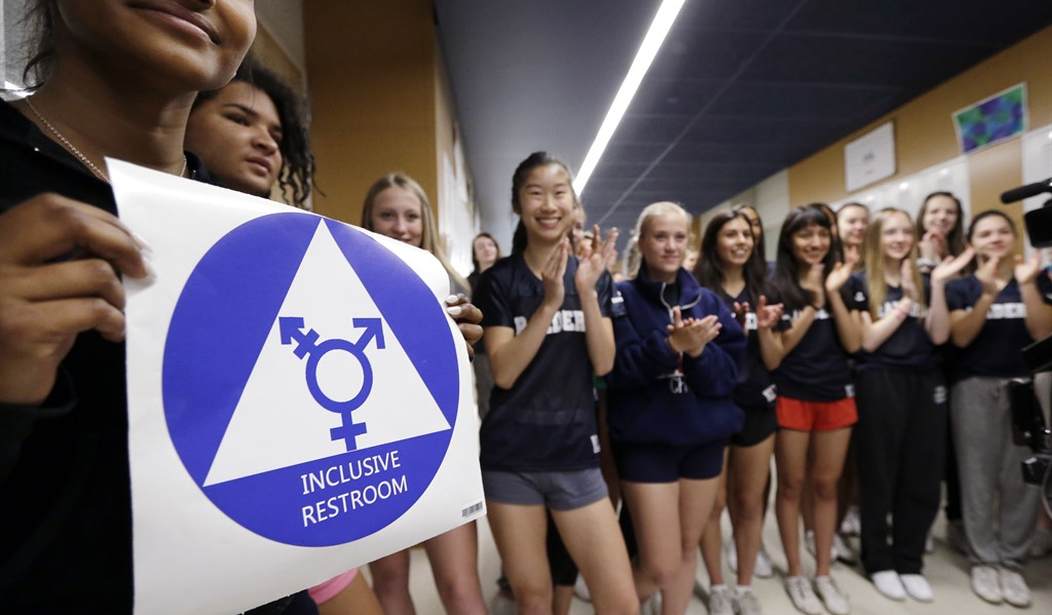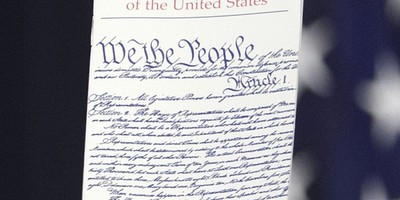Perish the thought of young girls being so prejudiced that they feel uncomfortable sharing the bathroom or gym shower with people equipped with penises. But if that happens, their parents might well resort to filing suits claiming their daughters' Title IX right not to feel they are in a sexually hostile environment has been violated.
But wait--wasn't it Title IX that the Obama administration cited on May 13 in ordering that henceforth people will be entitled to use not just the restroom facilities of their "biological sex" (this, apparently, is the state-of-the art term for what was once just called sex) but of the sex with which they identify?
So in using Title IX as the basis for both the administration's controversial guidelines on handling sexual misconduct accusations on campus and then for stipulating that restrooms must be open to people who have the physical characteristics of what was once the opposite sex, the administration may have set up a conflict between Title IX and . . . Title IX.
The first person who seems to have noticed the coming conflict is Harvard Law professor Jeannie Suk, who, writing in--of all places--the liberal New Yorker magazine, sets forth the argument in a groundbreaking article headlined "The Transgender Bathroom Debate and the Looming Title IX Crisis."
Title IX, as all veterans of the Title IX wars can reel off, is a 1972 statue that outlaws sexual discrimination in schools. Schools that practice sexual discrimination will not be eligible for federal funds. So far, so good. What's not to like?
Unfortunately, Title IX immediately attracted fans who saw that it could be used to further various agendas not stated in the original statute. Feminists groups quickly latched onto it to target male athletic programs. While Congress expressly forbade quotas when passing the statute, Title IX was soon invoked to establish proportionality—quotas—to dictate the number of male and female sports teams schools could offer on campus.
Recommended
College and university administrators came to realize that the only way to stave off costly lawsuits was to reduce men's sports to bring them into proportion to women's sports. Axing the wrestling team was far more palatable than paying the bills to defend against ruinous litigation from a feminist-led legal team. The effect on male sports was drastic--especially for wrestling, though wrestling was not alone. "A weary wrestling coach once lamented that his sport had survived the Fall of Rome, only to be vanquished by Title IX," Christina Hoff Sommers wrote in a Time magazine column headlined "How a Good Law Went Terribly Wrong." The column was published in 2014, the forty-second anniversary of Title IX.
The Obama administration could hardly be expected to ignore the protean propensities of Title IX in promoting its agenda. The first relevant use of Title IX came in a famous 2011 "Dear Colleagues" letter from the Education Department's Office of Civil Rights announcing, as Suk characterizes it, that "sexual violence is a form of sexual harassment and is therefore sex discrimination."
The 2011 "Dear Colleague" letter promulgated guidelines for handling accusations of sexual misconduct that critics say erode a cornerstone right of the western code of jurisprudence--the right of due process for the accused. Promoting campus tribunals rather than law enforcement, which has skills for dealing with sexual accusations, as the mechanism for handling complaints, the letter made it possible for women (and the accusers are far more likely to be women) to get the accused punished based on vague information that would never hold up in court. Suk and other Harvard professors have been critical of the guidelines, going so far as to join twenty-seven other members of the Harvard Law faculty in releasing a 2014 letter challenging both the administration's definition of sexual harassment and the procedures for dealing with allegations.
The latest "Dear Colleagues" from O.C.R. on May 13 that stipulated that schools will lose federal money if they do not allow students to use the facility “consistent with their gender identity” was also justified by Title IX. Suk, as you might expect from a Harvard professor, believes that the "appropriate bathrooms" for those calling themselves transgender are the ones that fit their gender identity.
What may be less expected is that Suk appears to question the administration's implicit belief that "Dear Colleague" letters have the force of law and that she furthermore shows how these two "Dear Colleague" letters put the new bathroom rules and the sexual misconduct guidelines on a collision course.
“Whether or not the federal government acted unlawfully," Suk writes, "it has now set in motion a potential Title IX collision course between its directives on sexual violence and on bathrooms. Schools attempting to comply with the federal bathroom policy have at least two possible ways of doing so: allow students to use sex-segregated bathrooms and locker rooms based on their gender identity, or move away from sex segregation of such facilities. The latter, gender-inclusive arrangement, which was in place in my college dormitory more than twenty years ago, is not uncommon on campuses, and a social movement to desegregate at least some portion of bathrooms is growing. Some colleges have made every bathroom on campus open to any gender, and this solution could well become a practical choice at K-12 public schools."
"But there is also a growing sense that some females will not feel safe sharing bathrooms, shower rooms, or locker rooms with males," Suk continues. "And if a female student claimed that a bathroom or locker room that her school had her share with male students caused her to feel sexually vulnerable and created a hostile environment, the complaint would be difficult to dismiss, particularly since the federal government has interpreted Title IX broadly and said that schools must try to prevent a hostile environment. This is not wholly hypothetical."
At Brandeis University, Suk recalls, a male student was judged to have engaged in sexual misconduct for looking at his boyfriend’s genitals in a school shower. This matter is currently in litigation. Continuing sexually-segregated bathrooms however may also be legally perilous. "According to the federal government," Suk notes, "a transgender girl who is told to use the boys’ locker room, or even a separate and private stall, instead of the girls’ facility, has a claim that the school is violating Title IX. A non-transgender girl who’s told she must share a locker room with boys may also have a claim that the school is violating Title IX. But would she not have a similar claim about having to share with students who identify as girls but are biologically male? Well, not if her discomfort and 'emotional strain' should be disregarded…The federal government is putting schools in a position where they may be sued whichever route they choose."
For Suk, the "common denominator" is not fear of transgender people but fear of assaults. But she argues that the discomfort that many, including sexual assault survivors, feel at being in bathrooms "with people with male sex organs, whatever their gender, is not easy to brush aside as bigotry."
The uses and abuses of Title IX have been due for a reckoning for a long time. Let's hope the left can stop crying "bigot" long enough to delve into both the legal and real-life aspects of the uses to which this simple statute has been put.
Isn’t it time for an originalist interpretation of Title IX?

























Join the conversation as a VIP Member